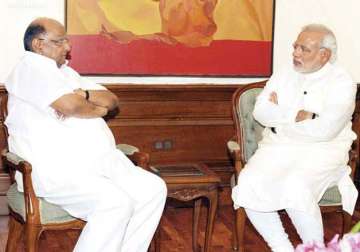Mumbai: Considerable political interest has been generated as Prime Minister Narendra Modi and NCP chief Sharad Pawar plan to have lunch together on Saturday, which happens to be Valentine's Day.
Modi will travel to the home of the Nationalist Congress Party chief in Baramati in Pune district after attending several events, including an expo at the Krishi Vigyan Kendra in Baramati, though NCP leaders claim it was nothing of political significance.
The meeting will be the highlight of Modi's day-long visit to Maharashtra with engagements in Pune and Mumbai.
NCP state president Sunil Tatkare, not willing to be dragged into any political speculation, retorted Thursday: "What is wrong if the prime minister attends a function pertaining to development?"
Modi will arrive in Pune Saturday morning and proceed to Chakan for a function at General Electrical, then a visit to Vidya Pratisthan Sanstha in Baramati, inauguration of the Appasaheb Pawar Hall, a visit to Krishi Vidyan Kendra, addressing a farmers' meet, and finally lunch with Pawar at his home before flying to Mumbai.
In Mumbai, he will attend the valedictory function of the Sesquicentennial Celebrations (150 years) of the Advocates Association of Western India.
Governor C.V. Rao, union Law Minister D.V. Sadananda Gowda, Chief Minister Devendra Fadnavis and other dignitaries shall be present on the occasion.
On Wednesday, Fadnavis sought to downplay the meeting by saying that Modi was not visiting Baramati to meet Pawar, but to attend an agricultural science expo.
"If the exhibition is being conducted at some venue under a centrally-sponsored scheme, what is wrong if the prime minister goes to witness it," Fadnavis asked.
He said that though there may be political differences between the Bharatiya Janata Party and the NCP, they would not treat Pawar as a political untouchable.
Modi had in October last year targeted Pawar and his nephew Ajit Pawar during the Maharashtra assembly election campaign.
He had called upon the electorate to dislodge the "uncle-nephew government" and labelled the NCP as "naturally corrupt party".
But after the elections, when the BJP emerged as the single largest party, the NCP had offered 'unconditional external support' in the interest of political stability - till a sulking Shiv Sena discarded the role of opposition party and joined the government a month later.
Later, Pawar had hit back by opposing Fadnavis's proposal to set up a high-level committee headed by Modi to oversee the development of Mumbai, while the NCP also protested against various plans to reduce the numero uno position of Mumbai.
Against this backdrop, Modi's visit to Maharashtra and a meeting with Pawar, coming shortly after the BJP's rout in the Delhi assembly polls, followed by Shiv Sena's bitter criticism of both Modi and the BJP, has naturally evoked great interest in political circles.
